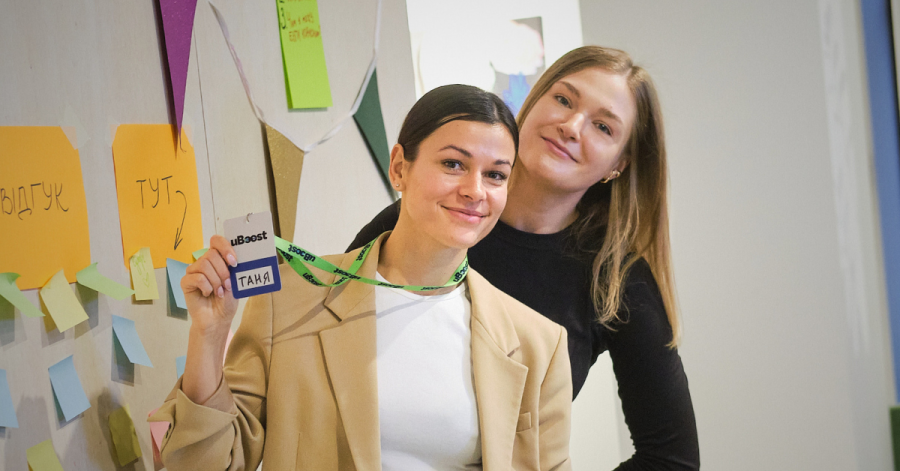When I started working with teenagers in Ukraine, I expected to meet a generation shaped by war — cautious, demotivated, and perhaps disillusioned. But what I found instead were bright-eyed young people with a practical approach to everything: teenagers who are already working on their future, not waiting for someone else to shape it for them.
I work with uBoost, an educational startup launched during wartime to help young people in Ukraine gain practical skills, mentorship, and tools for launching their own careers and businesses. Over the past year, we’ve reached teens nationwide — from Kharkiv to Zakarpattia — many of whom juggle school, displacement, and daily air raid alerts. What unites them is their drive to become what we call “Samotvorci” — self-made creators.
Lesson 1: Ukrainian teenagers are not waiting — they are building.
Take Yaroslav Onufrienko, a 19-year-old who fled Horlivka and relocated to Kharkiv. After completing one of our “Career Start” courses, he landed a job at an IT company. But he didn’t stop there — Yaroslav is already working on his startup: an “Airbnb for photo locations.” It’s still early-stage, but he’s testing, iterating, and dreaming big.
Then there’s Iryna, 17, from Boryslav in western Ukraine. While most teens scroll through social media, she’s designing Plastic Shield — a case for mines made from recycled plastic. Her dad is a veteran, so she takes this seriously. It’s not just a project — it’s personal. On April 25, she’s coming to Kyiv to pitch her idea and win support to build her first prototype.
Lesson 2: Ukrainian teenagers deeply care about staying — but only if there’s something to stay for.
According to PISA data, the education gap between urban and rural students is equivalent to 4–5 school years. Some students have had no stable schooling for months.
If we fail to offer relevant, real-world opportunities to young people now, we risk losing a whole generation—not just physically but mentally, emotionally, and economically. It’s a demographic and national security issue. The Institute of Demography projects that Ukraine’s population may shrink to 25 million by 2051. That’s not just fewer people—that’s fewer ideas, jobs, and builders.
Lesson 3: The formal education system isn’t enough. But communities can fill the gap.
I’ve seen small-town teens master learning management systems (LMS) with exceptional initiative and diligence. Digital tools allow us to personalize learning, track progress, and scale programs even in regions with unreliable internet or limited infrastructure. In some cases, all a student needs is a smartphone and mobile data. That’s enough to access a course, connect with a mentor, or pitch a startup idea in a group chat.
This flexibility is key when working in a country where the educational system is under extreme stress — internal reform and external threats. Young people need systems that move at their pace and reflect their realities.
We designed uBoost as a response to this education and economic crisis. We built a free, flexible learning platform that works on any device — even without a laptop or stable electricity. It combines a modern LMS with mentorship from real businesspeople and step-by-step project roadmaps tailored for teenagers. The goal isn’t to hand out certificates. It’s to give teens the tools to find a job, launch a project, or start a business today.
Some uBoost graduates are already interning at partner companies. Others are pitching startup ideas — sometimes without even calling them that. From print-on-demand T-shirts to mental health apps to local delivery services in towns where national logistics have broken down — these young people are already solving real problems.
Lesson 4: Mentorship isn’t a bonus — it’s a game changer.
One of the fastest ways to turn “I don’t know where to start” into “I’m already doing it” is to connect teens with someone just a few steps ahead. At uBoost, we bring in startup founders, product managers, marketers, and designers — often in their 20s — who remember exactly what it was like to take a leap of faith and start doing something with your life.
Teenagers don’t want theory. They want someone who can say: “Here’s how I got my first freelance gig” or “This is how I funded my first product with zero budget”. These mentors don’t give theory and boring homework — they give context, shortcuts, and encouragement. And that’s priceless.
Lesson 5: Ukraine is already a startup nation. We just need to make it visible to its youth.
Despite the war, more than 2,600 active startups operate in Ukraine. Their total value has tripled since 2020. The country now ranks in the top three fastest-growing startup ecosystems in Central and Eastern Europe, and fourth in total valuation. Most of these startups are bootstrapped — built with grit, borrowed laptops, and Telegram groups instead of VC money.
This culture of self-reliance resonates deeply with the teenagers I meet. They’re not dreaming of Silicon Valley. They’re dreaming of something real and grounded — being able to support themselves, their families, and, in some cases, their communities. Some of them are already the breadwinners in displaced households.
What do they need? Access. Tools. Encouragement. Community. Real role models. A belief that something is possible here. And fast, practical learning — not many-year programs that might be obsolete by graduation. We believe in creating a generation of samotvorci — people who build themselves and their future with their own hands. But they don’t have to do it alone.
Ukraine’s future isn’t something we wait for. It’s something we teach people to build. If we don’t invest in entrepreneurial education and youth initiatives now, the long-term cost will be staggering. Not just in lost businesses, but in lost dreams and lost trust. But if we do invest, give support, and start listening to what teenagers are actually asking for — then we’re not just preparing for the future. We’re shaping it.
The question isn’t whether Ukraine has a next generation of leaders. It does. The question is: how do we give them the tools to lead?








